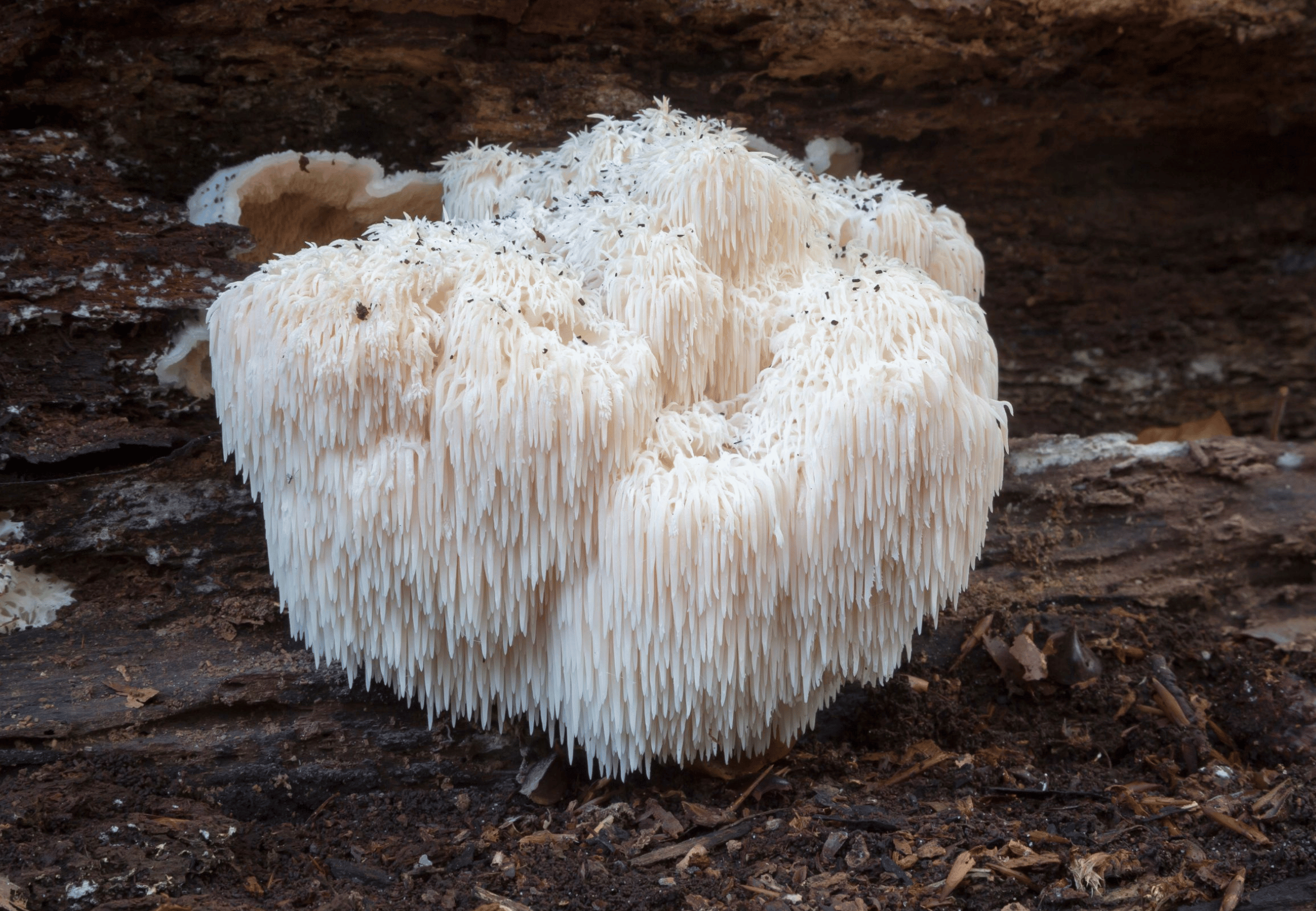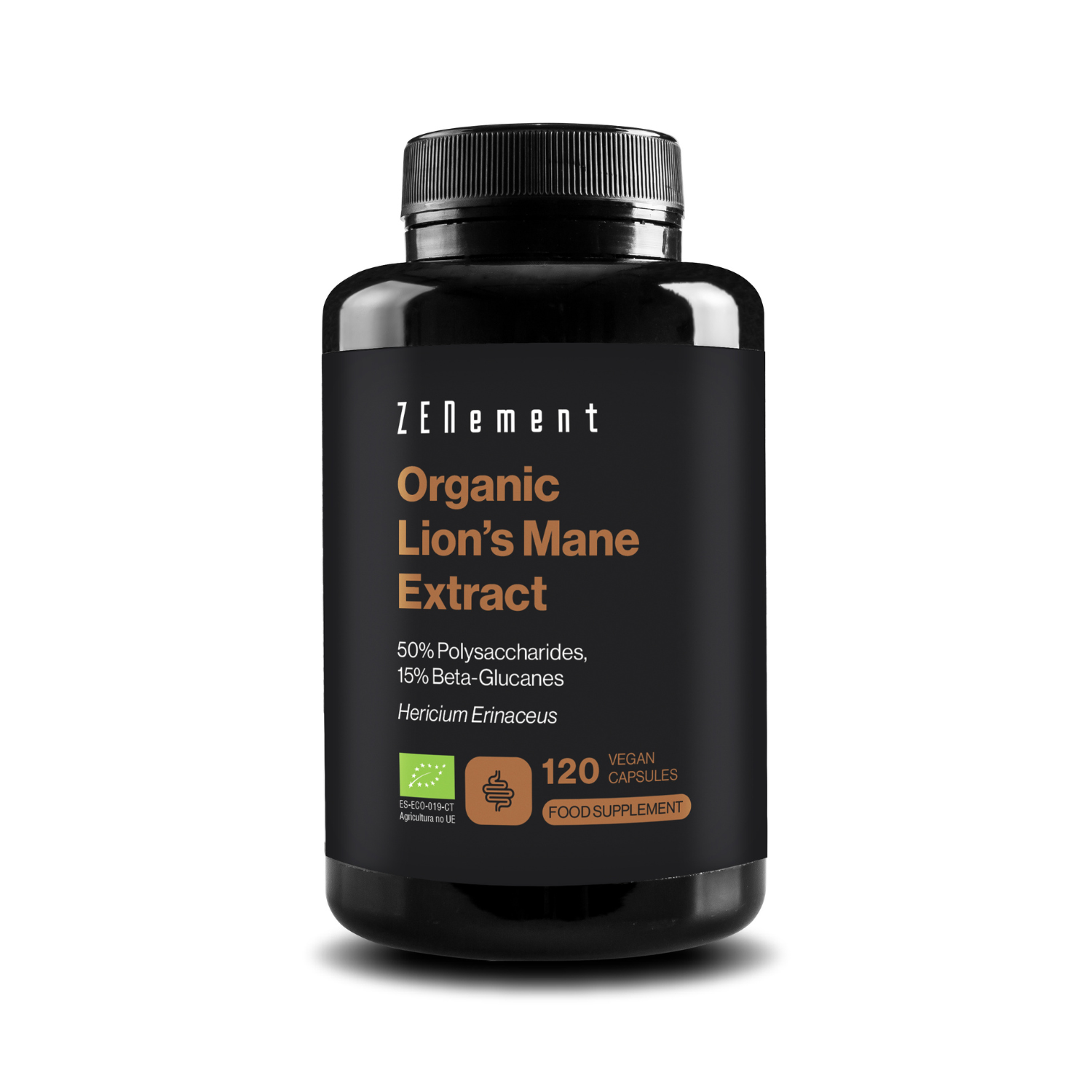Lion's Mane, a mushroom as peculiar in appearance as it is in name, has been a subject of fascination in traditional Asian medicine for centuries due to its potential to improve brain health and its adaptogenic properties. Scientifically known as Hericium erinaceus, this mushroom has also attracted the interest of modern science, leading to its increasing presence in food supplements for its many health benefits.
What is Lion's Mane?
Lion's Mane is a mushroom that grows in temperate forests, mainly in Asia, Europe, and North America. Its most distinctive feature is its appearance, which resembles a fluffy white mane (hence its curious name).
Lion's Mane has been used in Eastern medicine for centuries to improve gastrointestinal health, boost vitality and support cognitive function. But how were its properties discovered so many years ago? Knowledge of Lion's Mane was passed down through generations in communities where it grew naturally. Ancient Chinese herbalists documented their observations and experiences with the mushroom and included it in traditional medical texts. Its efficacy, observed through empirical use over the years, encouraged its inclusion in the traditional Chinese pharmacopoeia.
As trade and cultural exchanges between China and its neighbours expanded, so did knowledge of Lion's Mane. Modern research has begun to validate some of the traditional claims about its health benefits, increasing its popularity worldwide.
With the growing interest in holistic and natural medicine in the West, many have sought traditional alternatives such as Lion's Mane. As a result, this mushroom is now being used in food supplements to help improve various aspects of people's health [1].
Bioactive Components and Medicinal Properties
Lion's Mane is a mushroom that is highly prized due to its beneficial components, which are the ones that exert its beneficial properties for our health. These include polysaccharides (such as beta-glucans), hericenones, erinacins, and antioxidants.
-
Polysaccharides are complex carbohydrates made up of long chains of linked monosaccharide molecules (simple sugars). They play a vital role in providing structural, energy, and storage functions. In addition, these polysaccharides, such as beta-glucans, can act as prebiotics, dietary fibres that feed beneficial bacteria in the gut. By promoting the growth of healthy gut microbiota, Lion's Mane may help to improve digestion and nutrient absorption and strengthen the intestinal barrier. It is also thought to have a protective effect against stomach ulcers by inhibiting the growth of bacteria such as Helicobacter pylori and protecting the stomach lining against damage [2].
-
Hericenones and erinacins are bioactive compounds known to promote the synthesis of nerve growth factor (NGF) by crossing the blood-brain barrier. NGF is essential for the growth, maintenance and survival of nerve cells. This process may help to improve neuronal plasticity, which is essential for learning and memory [3].
- As a result of NGF's maintenance of neurons, Lion's Mane is also thought to have anxiolytic and adaptogenic effects by improving hippocampal function. These effects may contribute to better cognitive health by reducing stress and anxiety, factors that can negatively affect cognition [4].
- Antioxidants such as ergothioneine found in Lion's Mane may protect brain cells from damage caused by free radicals. This may reduce the risk of neurodegeneration associated with neurodegenerative diseases such as Alzheimer's and Parkinson's, thereby promoting the proper functioning of brain cells [5].
All of these properties make it a mushroom used to maintain brain and nerve health, improve digestive health, and maintain cognitive and mental health.
Lion's Mane Food Supplements
Lion's Mane (Hericium erinaceus) supplements have gained popularity in the health and well-being community due to their numerous benefits, which are supported by both traditional medicine and new scientific research.
All of these supplements, which are mainly presented in pharmaceutical forms such as capsules, powders, and extracts, aim to maximise the dosage and concentration of active ingredients, with the aim of achieving a faster and more effective therapeutic effect due to the greater amount of active ingredients found in this mushroom [6].
Zenement's Lion's Mane
Our supplement uses a 6:1 extract, which means that for every 6 grams of mushroom, you get 1 gram of extract. The 500 mg of extract in each capsule is therefore equivalent to 3 grams of the plant. The extract is enriched with 50% polysaccharides and 15% beta-glucans, providing a large amount of concentrated bioactive compounds to improve your cognitive, mental, and digestive health.
It also carries the European Euro Leaf label as an organic food supplement.
But how do we obtain our Lion's Mane extract? First, the mushroom is crushed and the extraction is carried out with water, then it is physically filtered, and the extract is mixed, concentrated, dried, sieved, and finally packaged.
Who Should Take Lion's Mane and How?
This food supplement is suitable for adults of all ages, especially those interested in improving their brain and cognitive health, those with digestive problems, or those seeking to manage their stress levels better.
However, it is important to consult a healthcare professional before starting to take any new food supplement, especially for those at risk such as pregnant or breastfeeding women or adults with pre-existing medical conditions.
How to take Lion's Mane depends on the extract concentration contained in the specific supplement. In our case, we recommend taking 1 capsule per day, preferably in the morning, for a maximum of 3 months, followed by a 2-month break to ensure the product's effectiveness and to allow your body to rest for a few months.
As you can see, Lion's Mane has a wide range of health benefits that make it an attractive supplement to include in your diet. From improving brain function and digestive health to promoting mental well-being, Chinese medicine has known for hundreds of years that this mushroom has a lot to offer!
References:
[1] Wang, M., Konishi, T., Gao, Y., Xu, D., & Gao, Q. (2015). Anti-Gastric Ulcer Activity of Polysaccharide Fraction Isolated from Mycelium Culture of Lion's Mane Medicinal Mushroom, Hericium erinaceus (Higher Basidiomycetes). International journal of medicinal mushrooms, 17(11), 1055–1060.
[2] Wang, G., Zhang, X., Maier, S. E., Zhang, L., & Maier, R. J. (2019). In Vitro and In Vivo Inhibition of Helicobacter pylori by Ethanolic Extracts of Lion's Mane Medicinal Mushroom, Hericium erinaceus (Agaricomycetes). International journal of medicinal mushrooms, 21(1), 1–11.
[3] Zhang, C. C., Yin, X., Cao, C. Y., Wei, J., Zhang, Q., & Gao, J. M. (2015). Chemical constituents from Hericium erinaceus and their ability to stimulate NGF-mediated neurite outgrowth on PC12 cells. Bioorganic & medicinal chemistry letters, 25(22), 5078–5082.
[4] Docherty, S., Doughty, F. L., & Smith, E. F. (2023). The Acute and Chronic Effects of Lion's Mane Mushroom Supplementation on Cognitive Function, Stress and Mood in Young Adults: A Double-Blind, Parallel Groups, Pilot Study. Nutrients, 15(22), 4842.
[5] Gregory, J., Vengalasetti, Y. V., Bredesen, D. E., & Rao, R. V. (2021). Neuroprotective Herbs for the Management of Alzheimer's Disease. Biomolecules, 11(4), 543.
[6] Ghosh, S., Nandi, S., Banerjee, A., Sarkar, S., Chakraborty, N., & Acharya, K. (2021). Prospecting medicinal properties of Lion's mane mushroom. Journal of food biochemistry, e13833. Advanced online publication.



